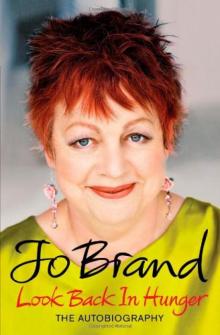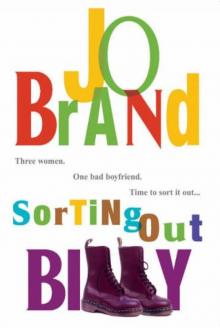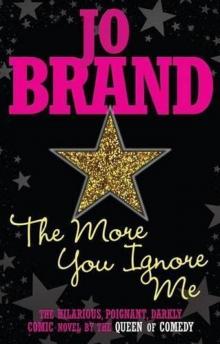Look Back in Hunger Read online
Page 3
My parents, like a lot of other parents at the time, felt that an upbringing in London was not the best way to move forward with three children, so when I was four we did what so many had done before us and jumped into the unknown … otherwise known as moving to the country.
CHAPTER THREE
COUNTRY LIFE, BUT NOT FOR POSH PEOPLE
Whenever I’ve been emotionally blackmailed into a quiz night, the quotations section frequently contains the L. P. Hartley quote from his novel The Go-Between: ‘The past is another country, they do things differently there.’
Well, to me, the country is another country and as far as I’m concerned they do stuff very, very differently there.
We began our rural idyll in what I would call ‘starter countryside’—near enough to London to contain hundreds of commuters and a whiff of city grime. Initially we moved into a rather isolated cottage just outside a village called St Mary’s Platt, in Kent, near Sevenoaks, commuter-belt land. We were a cycle-ride away from school, my brother Bill on his own little bike, me in one of those toddler seats on my mum’s bike. Come to think of it, I can’t actually remember where Matt was. Perhaps we left him in a hedge and my mum picked him up on the way back.
My dad was commuting up to London every day, doing something manly which I didn’t understand when I was four. To be honest, I don’t understand it very much now either. He was a structural engineer, as I’ve said, which is something to do with whether buildings stay up or fall down. He was also a bit of an expert on scaffolding, which I never refer to apart from in relation to ladies’ underwear. I think I had a line very early on in my comedy act about Isambard Kingdom Brunel designing my bra.
When we were teenagers my dad actually wrote a book on scaffolding, which sold well to those who were interested in that sort of thing. My dad took the summer off to write it and sat in our garage. Predictably, he got rather fed up being on his own all the time, poring over diagrams and researching the history of it. I think that’s probably when he began to get depressed. Who wouldn’t?
A book he has written which I much prefer and which was never published was his autobiography. He writes in a very pragmatic style which is easy to read and he has itemised the major incidents in his life and work. It’s fascinating if you’re in the Brand family, although searingly dull, possibly, if you’re not. I really appreciate him doing it because I have no memory to speak of. It has enabled me to put things in the right order in this book and detail a few bits from my early life with the precision of an engineer, which is not my normal modus operandi.
The cottage we lived in was semi-detached, and next door was Old Bloke With His Trousers Kept Up With String (although it’s possible he was only about thirty-five) and his family, who are, and may have been then too, just a blur. There was a very long track up to the house and we were surrounded by a smell that you could taste.
Townies may not know what I’m on about. Around us lay acres of fields containing sprouts, but that wasn’t the smell you could taste. I suspect the smell was something that had been sprayed on the sprouts which contained a shed-load of cell-mutating chemicals that invaded one’s entire nasal system and probably damaged one’s brain.
You’d think this might have put me off sprouts for eternity, but no, quite the opposite. I LOVE SPROUTS. Yes, I know they’re a vegetable and they’re good for you, but even so, cooked properly they are magnificent. Of course, nine times out of ten they aren’t cooked properly and I sympathise with the millions of school children who day after day had to eat something that was the consistency of a urine-soaked cat blanket.
Also, they have an entirely fair reputation for converting you into a wind machine, and most of you won’t know just how effective you can be in this field if you haven’t tried making sprout curry, a lethal dish invented by my friends Jane and Graham, who, funnily enough, nobody visits very much since that recipe came into existence.
The major incidents that occurred in this isolated spot both involved physical or emotional injury of some sort. In the first case, Bill threw the wheel off a wooden trolley thing quite high into the air and it landed on Matt’s head. During that time Matt seemed to us to be a miserable little sod who used to spend a large part of the day snivelling about some perceived insult, his face covered in snot. Therefore it took us a while, as neither of us witnessed the glorious moment of contact between wheel and head, to realise that Matt had actually been hit.
The parental reaction to this injury does not qualify for a place in my memory but I assume stitches were required, and I suppose Bill and I thought, ‘Well, at least you’ve got something to cry about now.’
Matt would have been about four at the time and I suppose, being the youngest, he was pissed off about quite a few things. Firstly, Bill and I were already at school and he was stuck at home all day. We were also able to do more things than him, like run faster, climb more trees and catch more butterflies. The image I have from that time is of him trailing behind us saying, ‘Wait for me!’ quite a lot, while Bill and I ran ahead, displaying the rather sadistic, uncaring attitude that a lot of siblings of that age tend to have, until they are knocked into shape. Although I don’t mean that literally.
Having said that, though, my parents weren’t averse to the occasional slap or smack to bring us into line. It seems odd that it is simply not acceptable these days, given that it was a part of my childhood. However, it was not something that happened very often and we would have to be pretty bad for smacking to occur. Eventually the anticipation of it was enough to control our behaviour, although for a small group of kids I knew this was not the case.
One boy in our class, who behaved appallingly by throwing things, stabbing children with his pencil and making a selection of farting noises, was regularly walloped by his dad, who seemed to have the patience of an angry nun. It made no difference to this kid at all. I suppose it’s similar to those people who don’t seem to be daunted by the prospect of going to prison. I bloody am.
As far as my parents were concerned, if one of us did something like hit the other one or deliberately break something that belonged to them then that would occasionally incur their wrath. There was no good cop/bad cop set-up with my parents. They were both quite happy to mete out the smacks from time to time and, as I remember it, they were both equally terrifying when they were angry.
We were brought up to be polite, well-behaved children, because my mum in particular couldn’t bear brattish behaviour of any sort, and I think she believed it was important to demonstrate to others that she was a good mother with controllable children. She also worked very hard to make sure we ate vegetables and fruit. I remember on a holiday in France, when I was perhaps seven or eight, we were all due to go to the cinema to see Snow White. Before this, though, we had to have dinner, and I mean ‘dinner’, which used to be in the middle of the day. At some point during my teenage years it was transferred to the evening, which I presume has something to do with the middle and upper classes. As children, we had breakfast, dinner and tea but these days we have breakfast, lunch and dinner. I cannot quite get used to saying ‘lunch’. I hear myself say it and think I sound like a twat, which is strange after all this time.
Anyway, back to dinner on holiday in France. Dinner was always meat, potatoes and vegetables, and in this instance the vegetable in question was cabbage, which Bill absolutely hated. We sat down to eat and we all cleared our plates except Bill, who refused to touch his cabbage. The more he was requested to do so, the more he dug his heels in and refused. I think my mum must have got increasingly frustrated because she told him that unless he ate his cabbage he wouldn’t be going to the film.
Whether he thought she was calling his bluff or not, I don’t know, but he absolutely refused to capitulate and eventually the limits were reached and he was informed he wasn’t going to the cinema. I think he was quite shocked, as he’d assumed she’d never follow it through by denying him such a big treat, which the pictures was then. This, of course, wa
s a bit of a pain because one of my parents then had to stay behind with him while Matt and I trolled off to see the film. I can’t even remember which parent now. Probably my dad.
Apart from these rare instances of revolution, we were good at occupying ourselves and playing together, despite random incidences of extreme competition. We spent a lot of time outside, building dens or chucking a ball about, and when we moved to an even more rural setting, we ventured further into the unknown, as it were, spending whole days in the woods.
The other major incident that occurred during this time, I only vaguely remember because I was on the periphery of it. When I recount it you may perhaps understand why my mum and dad didn’t sit us down and explain what had happened.
A little way up the track from us lived some travellers, who in those days were referred to as ‘gypsies’ (or ‘gippos’ by my dad). I have no idea how many there were—one family, perhaps two. I think most of the time the travellers rubbed along reasonably well with the settlers in the cottages, but one night it all went wrong and my dad and a male neighbour found themselves wandering up the track to remonstrate with them for some unacceptable social faux pas, be it noise, fires or bear baiting (only kidding).
Best intentions to maintain a dignified stance notwithstanding, their avowed peaceable position soon flew out of the window and my dad and the neighbour found themselves being chased back down the track by axe-wielding, angry people. Of course, in the telling, the story has become more exciting, with my dad and the neighbour narrowly escaping with their heads in the most recent version.
I’m not at all sure if the two are connected, but it seems to me that not long after this incident we moved from our lonely spot down into the village of St Mary’s Platt and ended up on an estate, the sort of English sixties version of Desperate Housewives, with manicured lawns, similar cars on each drive, which were dutifully washed of a Saturday morning, and an army of young families with young children our age.
This was much more village-living than our previous house about two miles away. We had a neat little garden, across which you could see lots of other neat little gardens, all filled with 2.4 children and a mum and dad. Most people went to church and the church fete was a big event in our lives. It was the one opportunity you got to do maypole dancing, which I really used to love, when you clutched your bit of coloured ribbon hanging off the pole and circled the pole, going over one kid’s ribbon and under another’s to create a sort of plaited effect. Years later I saw The Wicker Man in which a policeman goes to a remote Scottish island to investigate a murder and finds the place mired in ancient medieval customs, and it made me think of maypole dancing and its ancient roots.
Despite the suburban nature of this little estate, it was heaven for my brothers and me because it provided an instant social life, and we quickly formed a small gang who would hang around together at every opportunity.
We spent a lot of time with two girls called Amanda and Fiona, whose mum was very friendly with my mum. Both of them were quite naughty and in some ways alien creatures who would take far more risks than us and say things to their parents that we wouldn’t dream of saying or else we’d get a whack. I suppose it was just starting to dawn on me then, at around the age of six, that some parents were more liberal than others, and it was fascinating to see what other kids could get away with. The girls were allowed to have more choice in what they wore, for example. I was given clothes and had to put them on whether I liked them or not.
From a very early age, I suppose, I subconsciously absorbed the message that being a girly girl and dressing to please was not the way forward. So I was mainly to be found in a T-shirt, trousers and plimsolls, while other girls on the estate seemed to make more of an effort to wear pretty dresses and nice shoes. That’s not to say I didn’t have some nice dresses, I did, but opportunities to wear them were rare and within seconds of putting one on food would be spilled down it, much to the despair of my mum.
On the odd occasion, I baulked at what my mum expected me to wear. At some point she bought me a completely hideous fake-crocodile-skin coat which was white and grey. I remember sitting there staring at it and thinking I could not possibly wear it because somebody would definitely take the piss. But refusing to put it on wasn’t even an option, so I just had to grit my teeth and hope no one noticed. Of course, everyone did.
A few girls whose heads were filled with the very important details of what was fashionable that year sneered at my clothes, but rather than feel pressurised into forcing my mum to buy me something acceptable, I just thought these girls were sad and empty-headed, even though it was an ordeal being appraised by them.
My parents, it began to occur to me at this point, were quite rigid compared to other parents. Our television viewing was curtailed much more severely than that of other kids we knew, and so began the relentless pursuit, as it inevitably does, of parity with one’s peer group. Some parity, however, was achieved whenever a babysitter came round, which was especially good if it was a Saturday night and Doctor Who was on. I’m proud to say that I’m so old that I remember the first Doctor Who, William Hartnell, who looked like a wizened old male crone.
It scared the hell out of me, but I still wanted to watch it. Our babysitter seemed to be the female equivalent of the good Doctor, with her white hair and shapeless old people’s clothes. I estimated her age at over a hundred and was always surprised that she knew what a telly was, given that in her youth they probably had only just got hold of the wheel.
On one of these babysitting nights, when the adults were all attending a party together, we were allotted the joy of having many other children to stay. Feeling rather put out that we were not swinging with the grown-ups, one of the older, more precocious girls in our party organised an invasion of the adult shenanigans and we crept out past the crocheting babysitter in our pyjamas and nighties and pitched up at the party. Some swearing happened, I think, and we were all escorted back to our straitjacketed children’s bedtime with very little empathy.
My mother was working hard to turn us all into NICE CHILDREN, with modesty and politeness as our constant companions. Occasionally the mask slipped, however. Once I was wandering around in a new outfit and a neighbour remarked, ‘You look lovely, Jo.’ My reply, not mindful of my mum’s attempts, was ‘Yes, I do, don’t I?’
Lucky me. I remember it as a time of sweets— two pennies to spend every Friday after school at the sweet shop. Doesn’t sound much, but you could get a shed-load for that. And if you want to know what I chose, just step into one of those retro, fusty sweetshops and it is all arrayed there, but not quite as cheaply these days.
This must have been in about 1963, the beginning of the revolution that was going to allow women the pill and a bit more of a grasp on the testicles of life. That women were beginning to squeeze and cause some social, sexual and economic pain to men, who had had it all their way up to this point, can’t have gone unnoticed by my mum, who was still a housewife and mother. I would imagine thoughts were already in her head about finding herself a fulfilling position workwise.
One adage that was very much adhered to in our house was that it wasn’t good not to finish your dinner, for reasons mainly to do with starving children in Africa who would be only too pleased to get their hands on a plate of semi-regurgitated parsnips. Hence stand-offs with my mum would develop from time to time, owing to my refusal to down something which to me was not far off poison. Perhaps the worst was gooseberries. One of the popular children’s jokes of the time was ‘What’s hairy and goes up and down?’ the answer of course being A gooseberry in a lift’, although later in life it could have been applied to me after a mammoth drinking session, heaving forlornly into the nearest receptacle. But I became obsessed with this hairiness business and the thought of it put me off the whole idea of the innocent gooseberry, to the extent that I flatly refused to consume a gooseberry pie prepared lovingly by my mum. Cue a long stand-off, which she won. I shovelled them down and promptly vomi
ted them on to the carpet at the bottom of the stairs. No gooseberries were seen on my plate ever again.
Pets were foremost in our lives at this time and were all named in relentlessly prosaic fashion according to species. Therefore our hamster became Hammy and a baby hare we rescued from the jaws of some psycho cat became Harold, as Hare-y seemed even then just a little bit too much like Premier League football, in which every poor sod is given the requisite ‘y’ at the end of his name, such as Giggsy, unless it is too ridiculous, such as Rooney-y.
The admiration I already had for my mum was multiplied by ten when one day young Harold the Hare decided he’d had enough of living in our garden and being pawed by three grubby children and made a break for freedom. He set off at the speed of light and as we children realised he was off and began to cry, my mum went after him, somehow managing, as he leapt over the waist-high fence into the next garden, to follow him over in the style of a professional hurdler and grab his back legs in mid-air. We were dead impressed with her agility, having wrongly assumed before that she was not far off a zimmer frame. The fact that we suddenly realised she could probably do it for England gave her a frisson of glamour in our eyes.
We didn’t really have a lot of luck with pets. Our tortoise (what would he be called except Torty?) was not the greatest escapee on the block, but with grim determination he could make it out of our garden if he was given long enough, namely a week, which was the time we took when we went on holiday. Not wanting to lose him and find him several gardens down, we improvised a string harness and attached him to a tree, giving him enough space to roam a bit but not head for the hills.

 Can't Stand Up for Sitting Down
Can't Stand Up for Sitting Down Look Back in Hunger
Look Back in Hunger Sorting Out Billy
Sorting Out Billy The More You Ignore Me
The More You Ignore Me